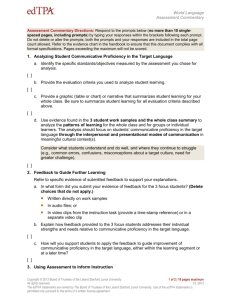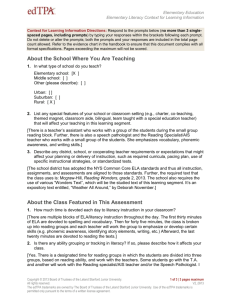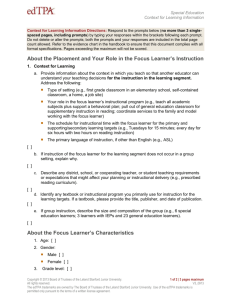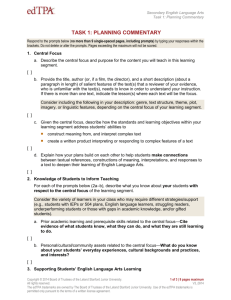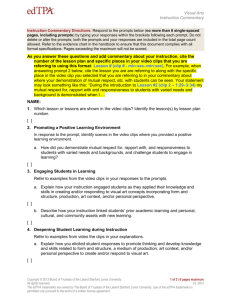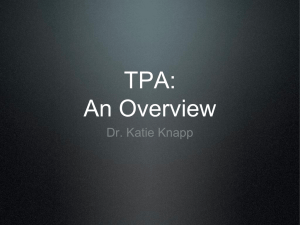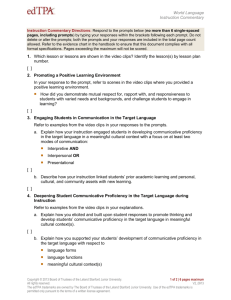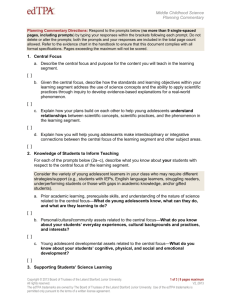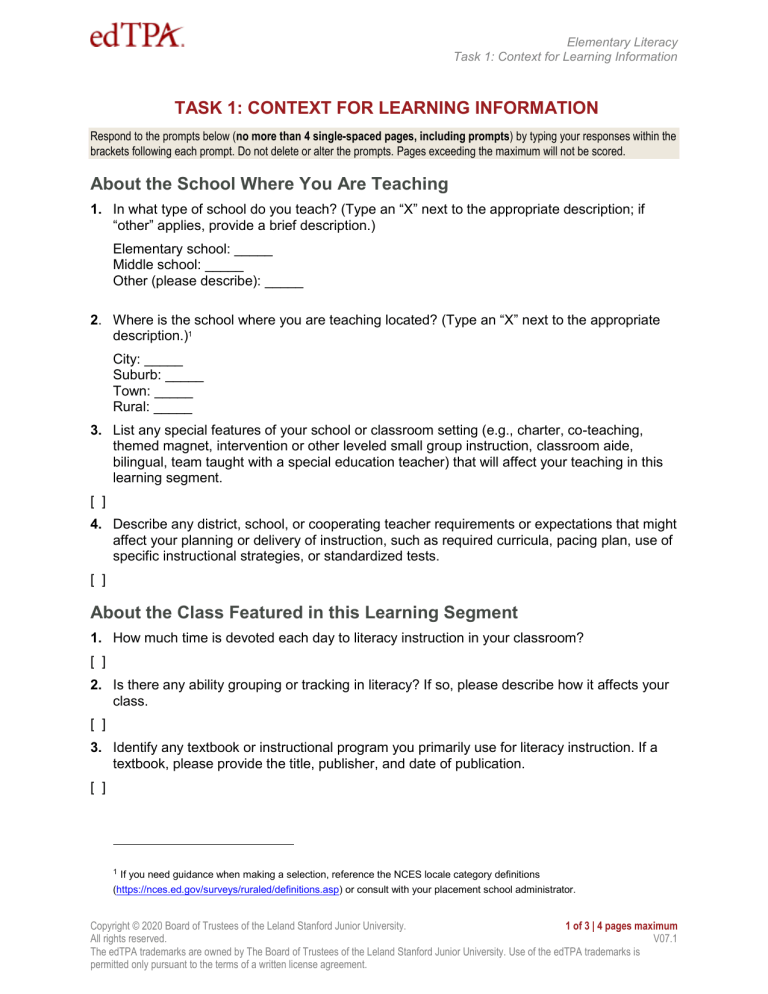
Elementary Literacy Task 1: Context for Learning Information TASK 1: CONTEXT FOR LEARNING INFORMATION Respond to the prompts below (no more than 4 single-spaced pages, including prompts) by typing your responses within the brackets following each prompt. Do not delete or alter the prompts. Pages exceeding the maximum will not be scored. About the School Where You Are Teaching 1. In what type of school do you teach? (Type an “X” next to the appropriate description; if “other” applies, provide a brief description.) Elementary school: _____ Middle school: _____ Other (please describe): _____ 2. Where is the school where you are teaching located? (Type an “X” next to the appropriate description.)1 City: _____ Suburb: _____ Town: _____ Rural: _____ 3. List any special features of your school or classroom setting (e.g., charter, co-teaching, themed magnet, intervention or other leveled small group instruction, classroom aide, bilingual, team taught with a special education teacher) that will affect your teaching in this learning segment. [ ] 4. Describe any district, school, or cooperating teacher requirements or expectations that might affect your planning or delivery of instruction, such as required curricula, pacing plan, use of specific instructional strategies, or standardized tests. [ ] About the Class Featured in this Learning Segment 1. How much time is devoted each day to literacy instruction in your classroom? [ ] 2. Is there any ability grouping or tracking in literacy? If so, please describe how it affects your class. [ ] 3. Identify any textbook or instructional program you primarily use for literacy instruction. If a textbook, please provide the title, publisher, and date of publication. [ ] 1 If you need guidance when making a selection, reference the NCES locale category definitions (https://nces.ed.gov/surveys/ruraled/definitions.asp) or consult with your placement school administrator. Copyright © 2020 Board of Trustees of the Leland Stanford Junior University. 1 of 3 | 4 pages maximum All rights reserved. V07.1 The edTPA trademarks are owned by The Board of Trustees of the Leland Stanford Junior University. Use of the edTPA trademarks is permitted only pursuant to the terms of a written license agreement. Elementary Literacy Task 1: Context for Learning Information 4. List other resources (e.g., electronic whiteboard, classroom library or other text sets, online professional resources) you use for literacy instruction in this class. [ ] About the Students in the Class Featured in this Learning Segment 1. Grade level(s): [ ] 2. Number of students in the class: _____ 3. Complete the charts below to summarize required or needed supports, accommodations, or modifications for your students that will affect your instruction in this learning segment. As needed, consult with your cooperating teacher to complete the charts. Some rows have been completed in italics as examples. Use as many rows as you need. Consider the variety of learners in your class who may require different strategies/supports or accommodations/modifications to instruction or assessment (e.g., students with Individualized Education Programs [IEPs] or 504 plans, students with specific language needs, students needing greater challenge or support, students who struggle with reading, students who are underperforming or those with gaps in academic knowledge). For Assessment Task 3, you will choose work samples from 3 focus students. At least one of the focus students must have an identified learning need (for example, an English language learner, a student with an IEP [Individualized Education Program] or 504 plan, a struggling reader, an underperforming student or a student with gaps in academic knowledge, and/or a gifted student needing greater support or challenge). Note: California candidates—within your edTPA, you must include an English language learner, a student with an identified disability, and a student from an underserved education group.2 Students with IEPs/504 Plans IEPs/504 Plans: Classifications/Needs Example: Visual processing Number of Students 2 Supports, Accommodations, Modifications, Pertinent IEP Goals Close monitoring, large print text, window card to isolate text Students with Specific Language Needs Language Needs Number of Students Supports, Accommodations, Modifications 2 California candidates—If you do not have any English language learners, select a student who is challenged by academic English. If you do not have a student with an identified disability or a student who is from an underserved education group, select a student receiving tiered support within the classroom or a student who often struggles with the content. Copyright © 2020 Board of Trustees of the Leland Stanford Junior University. 2 of 3 | 4 pages maximum All rights reserved. V07.1 The edTPA trademarks are owned by The Board of Trustees of the Leland Stanford Junior University. Use of the edTPA trademarks is permitted only pursuant to the terms of a written license agreement. Elementary Literacy Task 1: Context for Learning Information Example: English language learners with only a few words of English Example: Students who speak a variety of English other than that used in textbooks 2 5 Pre-teach key words and phrases through examples and graphic organizers (e.g., word cluster, manipulatives, visuals) Have students use pre-taught key words and graphic organizers to complete sentence starters Make connections between the language students bring and the language used in the textbook Students with Other Learning Needs Other Learning Needs Example: Struggling readers Number of Students 5 Supports, Accommodations, Modifications Leveled text, targeted guided reading, ongoing reading assessment (e.g., running records, miscue, conferencing) Copyright © 2020 Board of Trustees of the Leland Stanford Junior University. 3 of 3 | 4 pages maximum All rights reserved. V07.1 The edTPA trademarks are owned by The Board of Trustees of the Leland Stanford Junior University. Use of the edTPA trademarks is permitted only pursuant to the terms of a written license agreement.
